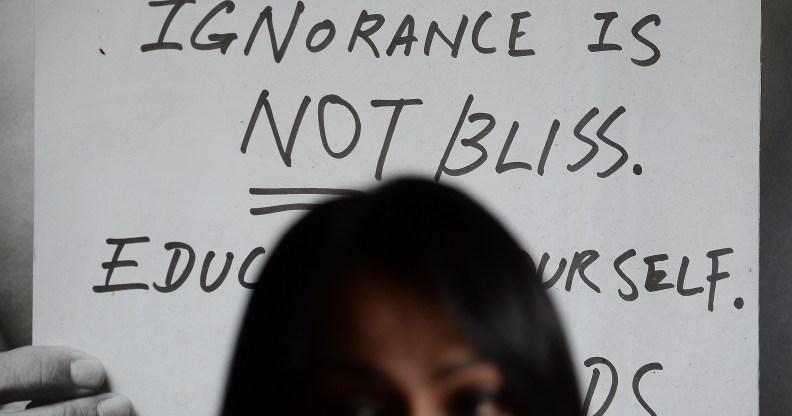Second death of a trans woman in a month shakes Malaysian community

Malaysian trans woman Nisha Ayub has asked the government to protect the community. (Manan Vatsyayana/AFP/Getty)
The death of a trans woman in the Malaysian town of Klang, the second in less than a month, has prompted calls for the government to better protect the LGBT+ community.
The body of the 37 year old was recovered by the side of a road on January 1 and brought to the Tengku Ampuan Rahimah Hospital (HTAR) Klang, where doctors notified the police, according to Malaysian publication The Star.
The injuries the woman sustained—on the left ankle, left eyebrow and to the nose—suggest she either fell or was thrown out of a vehicle.
Another trans woman died at the same hospital in December after being beaten by a group of young men.
“We need laws that protects people that emphasizes on Hate Crimes against gender identity or sexuality.”
— Nisha Ayub
Police have arrested a 55-year-old man in connection with the most recent death, which is not being currently treated as a hate crime. According to the police, the man accused the victim of stealing his mobile phone, which she denied, before allegedly jumping out of the moving vehicle.
The alleged theft of a mobile phone was also reported as being a motive in the murder of the trans woman beaten to death in December.
Killing of trans woman spurs calls for laws protecting LGBT+ community
Trans activist Nisha Ayub shared news of the death on Facebook, calling on the Malaysian government to help protect the community.
“It’s just so worrying to see such crimes being targeted towards the community. We need laws that protects people that emphasizes on Hate Crimes against gender identity or sexuality. The Transgender community are the easiest target because of our visibility.
“This is really sad and worrying to see how our community constantly being targeted and being exposed to such violence… I’m asking the Goverment to please look into the issue of Transgender people not from an identity matter but as human being that deserved to be protected and given equal opportunity as other,” she wrote.

Four young men were charged with the murder of a trans woman in December. (NST Online/youtube)
The current Malaysian government, led by 93-year-old Prime Minister Mahathir Mohamad, is facing criticism from human rights activists for failing to improve the state of LGBT+ rights in the country.
“A host of repressive laws remain on Malaysia’s statute books, including the notorious Sedition Act, which is still being used to silence peaceful critics, while the situation for LGBTI people and migrant workers in the country is deteriorating,” Rachel Chhoa-Howard, Amnesty International’s Malaysia researcher, said in a statement in August, as the government marked its first 100 days.
Ayub herself was subject to government censorship when her portrait, along with that of fellow LGBT+ activist Pang Khee Teik, was excluded from an art exhibition in August following the order of government minister Mujahid Yusof Rawa, who serves in the office of the prime minister.
The activist however took that opportunity to meet with Rawa to raise awareness about anti-LGBT discrimination in the country.

